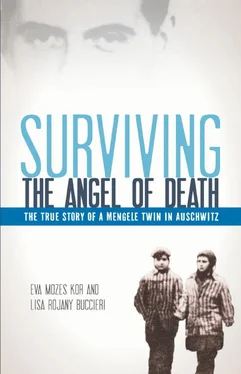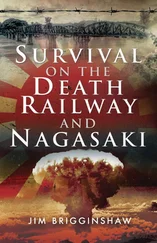As I understood only later from my reading, Adolf Hitler had come to power in Germany as the head of the Nazi party in 1933. Hitler hated Jews as much as the Romanian Iron Guard did, and leaders of the anti-Semitic and racist parties became allies, joining together in their hatred and their designs to rule all of Europe. Then in September 1939, World War II began when German Nazi troops invaded Poland. The Hungarians, under the leadership of Miklos Horthy, also trusted Hitler and became allies. All this began to happen around us, but still far enough away from us that only Papa fretted about our safety.
But in the summer of 1940, when Miriam and I were six years old, things changed. Hitler gave the northern part of Transylvania to Hungary. At that time the population in Transylvania, the larger area surrounding our village, was half-Hungarian, half-Romanian. But everyone in our village was Romanian. Rumors spread that the Hungarian army would kill Jews and Romanians and set our village on fire. Even as a six-year-old child, I knew we were in danger.
Miriam, the quieter of the two of us, felt my anxiety, must have seen it on my face and in my body language. But she never complained; it was not her nature.
One day Hungarian soldiers marched into our village, the commanding officer leading the troops in a long, shiny black car. It was impressive, as it was intended to be. We villagers were to take note: The armies were now in power, so we were to welcome them! We heard the soldiers singing, “We are Horthy’s soldiers, the best-looking soldiers in the world.”
That night, my mother and father allowed the soldiers to camp in our yard; the commanding officer slept in our guest room. Mama treated the officers like company: She baked her best torte and invited the officers to dine with our family. I remember that there was much conversation about good food, and Miriam and I were excited to sit at the table with these important men in uniform. It was a pleasant evening, and the officers praised Mama’s cooking and baking. Before they went to sleep, they kissed her hand as they thanked her, a courtly habit of many European and Hungarian men of the time. Early the next morning they left, and our parents seemed to be reassured.
“See?” said Mama. “There is no truth to the talk that they are killing the Jews. They are real gentlemen.”
“Why would people tell such stories?” Papa asked, not expecting an answer, much less disagreement from my mother or anyone else in the family. “You’re right. Nazis will never come to a small village like ours,” he concluded. Th is we were to take as fact. Papa had said it.
Yet late at night, behind closed doors, our parents listened to a battery-operated radio. They spoke to each other in Yiddish, a language none of us girls understood, as they discussed the news. What was it they were hearing that could be so secret? That could make them try to hide it from us girls?
I pressed my ear against the door and eavesdropped, trying to hear what was happening. “Who is Hitler?” I asked when they came out.
Mama brushed off our questions with blithe reassurances: “You don’t need to worry about anything. Everything will be fine.” But we had overheard some of the radio broadcasts with Hitler yelling about killing all the Jews. As if we were bugs! We felt there was trouble, no matter how much our parents tried to reassure us otherwise. And because of their secretive behavior, even Miriam became anxious. We were always worried, even as young children. There was a disquiet about the unspoken, the undiscussed.
That autumn, in 1940, Miriam and I started school. Unlike elementary schools today, our schoolhouse had children from first grade to the fourth grade in one room. Miriam and I were the only Jews. We were also the only twins. Every day we wore matching outfits to school and the same color ribbons tied at the ends of our long braids. Like our family had before them, our new classmates enjoyed figuring out which twin was which.
We also discovered we had two new Hungarian teachers at school who had been brought in from the city by the Nazis. To my surprise, they brought with them books containing slurs against Jews. The books also showed cartoon caricatures depicting Jews as clowns with big noses and bulging bellies. And marvel of marvels, for the first time, we saw “jumping pictures” projected on the wall—which is what we called early motion pictures because we did not know what a film was. I clearly remember watching the short film called “How to Catch and Kill a Jew.” These propaganda films, something like today’s commercials but filled with hatred, were shown before feature films in the theaters in cities. Imagine watching instructions on how to kill Jews right before a Pixar movie!
Watching the hate movie and reading these racist books inflamed the other students. Our friends, or other children who had been friends, started calling Miriam and me names like “dirty, smelly Jews.” Their name-calling really made me angry. Who were they to call us dirty? I knew I was as clean if not cleaner than any of them! Kids began to spit at us and beat us up at every opportunity. One day, our math book contained this problem: “If you had five Jews, and you killed three Jews, how many Jews would be left?”
Upset and frightened, Miriam and I ran home crying. Our clothes were filthy from being pushed into the dirt once again, and our dusty faces were streaked with tears. “Children, I’m so sorry,” Mama said, hugging and kissing us, “but there is nothing we can do. Don’t worry! Just be good girls. Say your prayers, do your chores around the farm, and study your reading.”
One day at school in 1941 some boys played a trick on the teacher when her back was turned. They placed birds’ eggs on her chair. The entire class knew they were there, but no one said a word. We all held our breath as she turned around and sat down. Of course, the second her behind hit the chair, the eggs broke, spattering on her new dress.
“The dirty Jews did it!” stated one of the boys in our class matter-of-factly.
“Did you?” asked the teacher, looking at Miriam and me.
“No, Madame Teacher, no!” We were horrified. We had never misbehaved like that or played a trick on a teacher. We would never have heard the end of it from our parents had we dared! And we loved school and loved learning.
And then it happened. “Yes, they did!” screamed the other children. “They did it! We saw them!” It was as if they had all made a secret pact behind our backs beforehand, and this was the result.
Miriam and I protested, but to no avail. We were Jews, and we were guilty.
Without asking more questions, the teacher called us up to the front of the class for our punishment. She threw dry corn kernels onto the floor. “Kneel!” she demanded, pointing to us. For an hour, she made us kneel on those corn kernels in front of the class. The hard kernels dug into the flesh of our bare knees. But that was not what really wounded us the most. What hurt most were our classmates taunting us, leering at us, making ugly, smirking faces at us. Miriam and I were as shocked as we were hurt.
When we came home and told our mother, crying and hugging us, she said, “Children, I am sorry. We are Jews, and we just have to take it. There is nothing we can do.” Her words made me angrier than the teacher’s punishment. I wanted to hit someone myself, pound something hard like those kernels into dry corn dust. How could Mama’s words be true?
When Papa came in from farming at the end of the day and heard what had happened to us, his attitude was like Mama’s. “For two thousand years the Jews have believed that if they tried to get along, they would survive,” he said. “We must obey tradition. Just try to get along.” Papa reasoned that since we lived so far out in the middle of nowhere, the Nazis would not bother to come take us away.
Читать дальше












